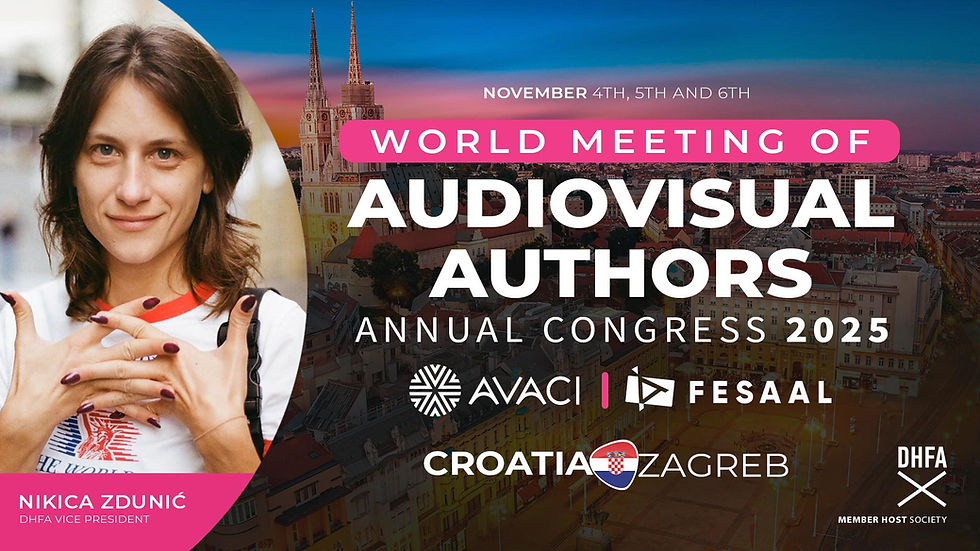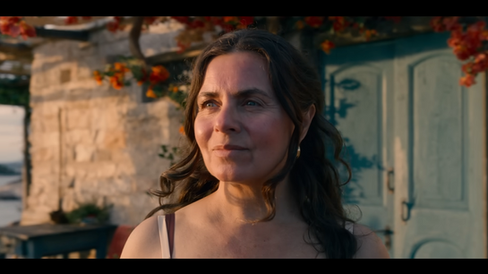International Congress AVACI / FESAAL 2025 - Worldwide Audiovisual Authors Meeting: Interview with Nikica Zdunić
- Oct 3, 2025
- 4 min read

The city of Zagreb will host, in November, the Congress of the Federation of Latin American Audiovisual Authors’ Societies (FESAAL) —on the 4th— and the Congress of the International Confederation of Audiovisual Authors (AVACI) —on the 5th and 6th— with the Croatian Film Directors’ Guild (DHFA) serving as the host organization.
By Ulises Román Rodríguez
This gathering will bring together leading figures from the audiovisual field around the world and will place at the center of the debate a decisive topic: the protection of authors’ rights and the future of the creative industries in a context shaped by digital platforms and new technologies.
In this context, Nikica Zdunić, director, screenwriter, and vice president of DHFA, shares in an interview with AV Creators News a lucid and critical perspective on the current state of the industry, the challenges faced by women creators, and the expectations surrounding both congresses.

Nikica Zdunić, Croatian director and vice-president of DHFA
Zdunić begins with a clear diagnosis: the global audiovisual industry remains predominantly male, and Croatia is no exception. With conservative and patriarchal structures, women face systemic barriers to accessing leadership positions. “I have seen how male colleagues, less qualified or with less experience, get opportunities that are not offered to women. This generates inequality in income, in the ability to grow professionally, and in development conditions,” says Zdunić.
The main obstacle, according to her, lies in “the lack of respect for women’s authority and creative vision. Even when they achieve recognition, women have to be exceptional to be treated as equal to an average man, and still, they risk being overlooked for key positions.” When asked whether there has been progress on gender equality, her answer is blunt: “No.”
The role of international organizations
For Zdunić, organizations like AVACI play a decisive role in reversing this situation. The key is to change the conversation: “Women already know the barriers. It’s men who must be held accountable, educated, and encouraged to change exclusionary practices.” She proposes concrete tools: conditional funds, tax incentives, and transparency metrics. “The industry responds to economic pressure: only when inclusion becomes profitable will we see real change,” she states.
13+ (2016), Opet, unedogled (2017) and Sovjetski psi (2018), directed by Nikica Zdunić
The AVACI 2025 Congress: local and regional impact
The vice president of DHFA emphasizes the magnitude of the upcoming event. “Hosting the Congress is an enormous honor for Croatia and a unique opportunity to highlight the importance of authors’ rights and creative work in our region.”
At the local level, she points out that the Congress will help “raise awareness about the protection of our rights as audiovisual authors” and promote legislative changes that ensure “fair compensation and long-term stability for creators.” At the regional level, the expectation is that the Congress will unite the countries of the Balkans and Central and Eastern Europe to address shared challenges, such as outdated royalty systems or insufficient legal protection. “This is our moment to prove that even small markets have a voice and must be part of the global conversation—not as observers, but as active participants,” she stresses.

Gender Talk at AVACI Congress 2024
Expectations and priorities
Focusing on the priorities for this Congress, which gathers audiovisual creators from around the world, Zdunić argues that “concrete mechanisms are needed so that collective management organizations can influence the reform and enforcement of authors’ rights laws,” as well as the “strengthening of collaboration with national broadcasters to ensure the effective implementation of authors’ rights.” This would allow “moving from theoretical discussions to action plans that practically benefit creators, especially in small markets like Croatia.”
Faraway (2014), directed by Vanessa Jopp
The digital challenge and artificial intelligence
Adapting to digital platforms and artificial intelligence is not, for Zdunić, a matter of technology but of cultural identity. “The risk lies in losing our authentic voice and becoming mere subcontractors of content, instead of cultural innovators,” she warns. Here, the reform of authors’ rights and effective collective management must serve as cultural infrastructure to guarantee creators’ sustainability and protect diversity against global homogenization.
On balancing creative freedom and commercial pressures, Zdunić draws a clear distinction: artistic and commercial cinema follow different logics. Yet she warns that neglecting audience education has hindered the distribution of valuable content. “I firmly believe in audiences. People can recognize quality, and substantive art must remain accessible to everyone. Public media have an essential role to play here,” she notes.
The future of Croatian audiovisual creation
Despite the obstacles, Zdunić views the future with optimism: Croatia continues to produce works of historical significance every year, sustained by a community of creators who prioritize authenticity and truth over superficial trends. “I dream of a society that understands cinema as a tool to strengthen national identity and invests in its development. I want an industry where creators are at the heart of national television, where our audiovisual heritage is preserved and accessible to all,” she declares.
The voice of Nikica Zdunić encapsulates the dilemmas of audiovisual creation in Croatia and the region: gender equality, the defense of authors’ rights, adaptation to the digital age, and the challenge of maintaining cultural authenticity. The FESAAL and AVACI Congresses —with DHFA as host— are set to become a key stage for transforming these discussions into concrete actions that will shape the future of cinema in Croatia, the Balkans, and beyond.















Comments